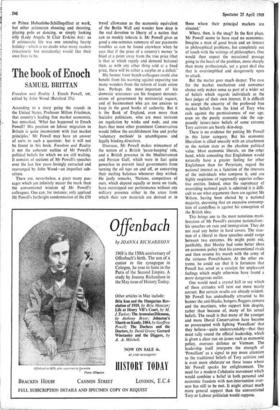The book of Enoch
SAMUEL BRITTAN
According to a story going the rounds in the United States, Professor Milton Friedman, that country's leading free market economist, has remarked, 'What has happened to Enoch Powell? His position on labour migration to Britain is quite inconsistent with free market principles.' Mr Powell may have an answer of sorts to such a question: but it will not be found in this book. Freedom and Reality is not the coherent outline of Mr Powell's political beliefs for which we are still waiting. It consists of sections of Mr Powell's speeches over the last few years lovingly extracted and rearranged by John Wood—an imperfect sub- stitute.
There are, nevertheless, a great many pas- sages which are infinitely nearer the mark than the conventional wisdom of Mr Powell's colleagues. One can, for instance, only applaud Mr Powell's forthright condemnation of the £50 travel allowance as the economic equivalent of the Berlin Wall and wonder how deep is the real devotion to liberty of a nation that can so meekly tolerate it. Mr Powell gives as good a one-sentence summary of our payments troubles as can be found anywhere when he says that if the price of a country's money 'is fixed at a point away from the true price (that is that at which supply and demand balance) then, as with any other thing sold at a fixed price, there will be either a surplus or a deficit.'
His former front bench colleagues could also benefit from his warning against expecting too many wonders from the reform of trade union law. Perhaps the most important of his domestic utterances are his frequent denunci- ations of government by ministerial request, and of businessmen who are too anxious to keep in the good books of authority. But it is the Bank of England, even more than Socialist politicians, who are most insistent on regulation by winks and nods, and one fears that most other prominent Conservatives would follow the establishment line and prefer 'voluntary methods' to unambiguous and legally binding directives.
Overseas, Mr Powell makes mincemeat of the notion of a British 'peace-keeping' role, and a British presence in the Mediterranean and Persian Gulf, which were in fact quite powerless to prevent local governments from turning the oil taps on and off, or converting their sterling balances whenever they wished. He justly remarks, 'Nations, competitors of ours, which depend equally or more on trade, have outstripped our performance without any military presence either in the areas from which their raw materials are derived or in those where their principal markets are situated.'
Where, then, is the snag? In the first place, Mr Powell seems to have read no economics. Imagine a man of good brain and an interest in philosophical problems, but completely out of touch with the writings of philosophers. One would then expect the occasional passage going to the heart of the problem, more sharply than many professionals, yet a great deal else that is oversimplified and dangerously open to attack.
But the matter goes much deeper. The case for the market mechanism and consumer choice only makes sense as part of a wider set of beliefs which regards individuals as the best judges of their own interest. It is difficult to accept the sincerity of the professed free market beliefs from the kind of Tory who rails against the permissiveness of our age; even on the purely economic side the sup- posedly- laissez-faire beliefs of some extreme Tory activists are barely skin-deep.
There is no evidence for putting Mr Powell in this latter category. But his economic liberalism is allied uneasily with an attachment to the nation state as the absolute political value. Most economic liberals, on the. other hand, while conceding that Englishmen would naturally have a greater feeling for other Englishmen than for Peruvians, regard the national interest as a function of the interests of the individuals who compose it, and are highly suspicious of supposedly superior collec- tive entities. Indeed, once the supremacy of overriding national goals is admitted it is diffi- cult to see what arguments there are against Mr Wilson, having been elected by a national majority, decreeing that an excessive consump- tion of candyfloss is against his conception of the British idea.
This brings one to the most notorious mani- festation of Mr Powell's extreme nationalism: his speeches on race and immigration. They do not read any better in hard covers. The reac- tion of a liberal to these speeches could range between two extremes. He might point out, justifiably, that Mosley had some better ideas 'on economic policy than his conventional rivals and then resume his march with the army of the virtuous Powell-haters. At the other ex- treme, he could say that it is fortunate that Powell has acted as a catalyst for unpleasant feelings which might otherwise have found a more dangerous outlet. One would need a crystal ball to say which of these attitudes will turn out more nearly correct. But certain results are already evident. Mr Powell has undoubtedly attracted to his banner the anti-blacks, hangers, floggers, censors and the martinets, who support him despite, rather than because of, many of his actual beliefs. The result is that many of the younger and more liberal Conservatives have become so preoccupied with fighting 'Powellism' that they believe—quite understandably—that they must rally round the official leadership, which is given a clear run on issues such as economic policy, overseas defence or Vietnam. The leadership itself interprets the strength of 'Powellism' as a signal to pay more attention to the traditional beliefs of Tory activists and is even more obdurate' on those issues where Mr Powell speaks for enlightenment. The need for a modern Cobdenite movement which would combine a belief in both personal and economic freedom with non-intervention over- seas has still to be met. It might attract much more general support than the conventional Tory or Labour politician would suppose.










































 Previous page
Previous page